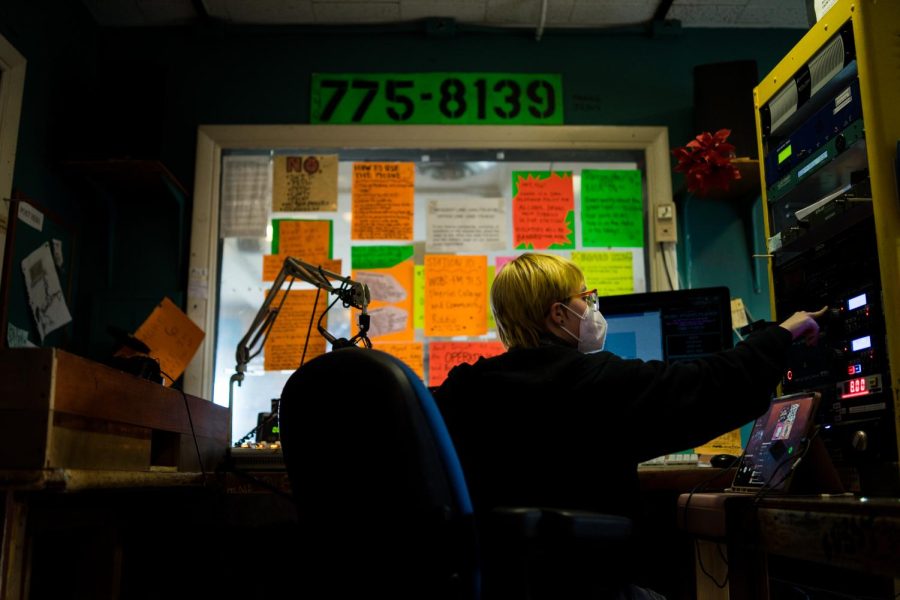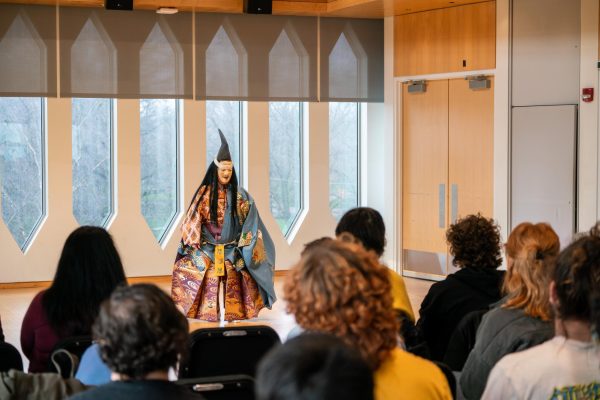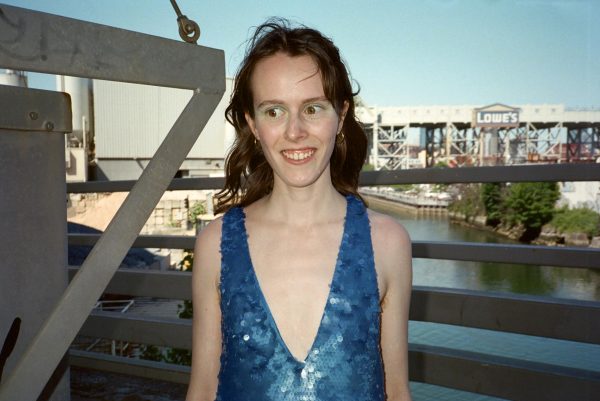WOBC Staff, Board Hope to Revive Station Engagement
The College’s recent announcement of the Wilder Hall renovation will result in the relocation of the WOBC 91.5 FM studio, fanning preexistent fears of the disappearance of institutional memory in the wake of COVID-19.
Despite the decades of history scrawled on the station’s aqua-blue walls, Oberlin’s College and community radio station is far from immune to the epidemic of institutional memory loss. Fanning these worries even further, WOBC announced yesterday that the station was going to be disassembled and moved to a different part of Wilder Hall as a result of the upcoming renovations to the building.
WOBC 91.5 FM runs, in part, by delegating station tasks to workgroup leaders, who coordinate groups of DJs. These groups accomplish tasks like listening to new music sent to the station by indie artists hoping to receive radio play, brainstorming station-wide merch, or recording PSAs. The music is listened to and sorted by the traffic workgroup into genre boxes, which are then assessed by genre-based workgroups that decide whether music should be placed in WOBC’s vault. Other workgroups, like outreach and promotion, focus more on management of and publicity for the station. After years of pandemic interruptions, these workgroups have fallen by the wayside, facing issues with attendance and lack of engagement with the campus as a whole.
“Since COVID, workgroups and staff positions have been forgotten and fallen under the radar,” said WOBC Music Director and College fourth-year Emma DeRogatis-Frilingos. “It’s no fault to the staff, no fault to the station — that’s just COVID. There’s been a campus-wide forgetfulness; clubs and traditions have been disappearing. … There’s been a complete and utter disruption, and it’s hard to focus on little things like tradition and consistency.”
As WOBC’s music director, DeRogatis-Frilingos oversees the staff, and noted that her goal this year has been to create as much community as possible in hopes of reviving institutional memory.
“My goal was to create a strong foundation specifically with the staff who oversee the work groups, so when we leave, people know the basics of what running a station looks like and how a functioning station happens,” she said. “What I’ve been doing … has been to try to cultivate more community. I don’t know how successful it’s been.”
College second-year Imogen Pranger, who co-directs the traffic workgroup alongside College third-year Ish Houle, hopes that revitalizing workgroups can help recover a sense of community within WOBC.
“It can feel very isolating to just go do your show, and only ever speak to the people before and after you on the show schedule,” she said. “You never get a sense of the larger scope of the people that are involved in WOBC, and how amazing all the other DJs are, how interesting and how much history the station has as a whole. I think workgroups can be a really important vehicle for cultivating that sense of community and purpose within the station.”
Besides a lack of community, there are very real stakes to maintaining a functioning station. A failure to complete small tasks could result in the station losing its decades-long connections with record labels and other stations. One major issue preventing workgroups from functioning properly has been attendance. Without DJs to sort through music, there is little that groups can accomplish.
“That’s been an issue forever with work groups — DJs just not showing up, because there is no punishment,” DeRogatis-Frilingos said. “We’re not going to take away someone’s show because they’re not showing up to a work group; that’s just not sustainable. It’s supposed to be for fun, but that affects the entire station. We were brainstorming ideas of how to get people to show up, aside from being threatening. I felt like people were tossing up some really good ideas, but … I needed to ask: is this going to happen?”
In the hope of cultivating community, the station has dedicated more attention to staff meetings, which allow the staff members to get to know each other and discuss their common problems with reviving institutional memory. The board and staff have found creative ways to bring DJs and staff together, even reintroducing their intramural softball team, a tradition from years past.
Pranger is helping organize an Amoeba Music-inspired “What’s In My Bag”-style video hosted by the traffic workgroup. The event will create space for WOBC DJs to share music that they particularly enjoy.
“It’s an event to help publicize all the amazing music that we are getting submitted to the station,” Pranger said. “That’s my real joy in doing traffic: finding all this music that sometimes doesn’t have a lot of streams and is really underground, that is really amazing and needs to be shared, needs to be played, needs to be listened to. We just want to share the love of that music and what traffic is all about with this event.”
Such events are glimmers of hope in the face of the pitfalls of institutional forgetfulness. Younger WOBC staff members like Pranger have little knowledge of what the station was like before COVID-19. DeRogatis-Frilingos noted that there used to be frequent engagement events hosted by WOBC.
“When I was a freshman and sophomore, events with WOBC were happening all the time, just because the staff wanted to do it,” she said. “There needs to be that want, that initiative. Without it, it’s not going to happen, and if it doesn’t happen now, it’s never going to happen because they’re setting the precedent for the next group coming in. … Before, I remember there always being like … ‘Oh, there’s gonna be a show this week,’ or, ‘Oh, there’s gonna be a party,’ or, ‘Oh, there’s a performer coming,’ or, ‘We’re tie-dying in someone’s backyard.’ You can’t do that with COVID — you can’t gather. It’s hard to be present when you have to wear a mask, and it’s not as fun.”
College third-year and Vault Workgroup Director Emelia Duserick echoed DeRogatis-Frilingos’ statement, and noted her hope for the future.
“I do think there was a lot more excitement about WOBC in general and bonding between the staff members and board [in past years],” Duserick wrote in an email to the Review. “I think it can feel disjointed at times now, and getting that level of excitement and engagement back is something we’re all actively working on. I think that it can come back, it’s just going to take work. I’ve already seen a big difference this semester though, which keeps me hopeful.”
Even with the recent announcement of the station’s move, DeRogatis-Frilingos remains optimistic.
“Things are getting better,” she said. “This semester, I’ve been impressed with the staff’s enthusiasm and creativity, and concrete events are being planned. That’s all I care about — people having fun. It should not be a stressful environment at all.”










